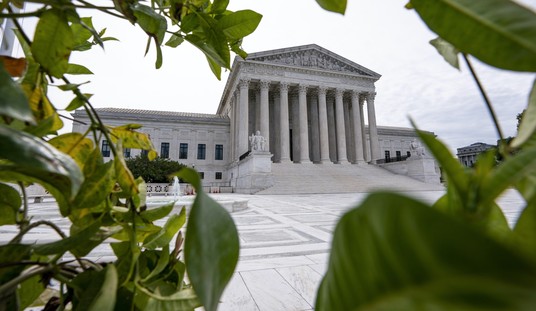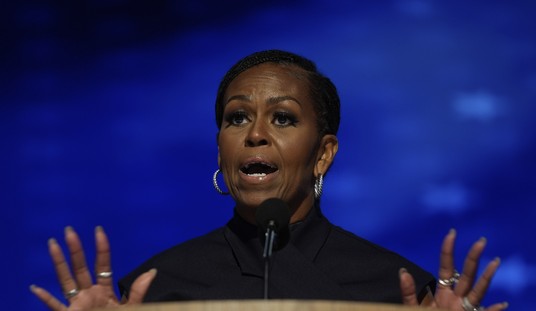First, a note to everyone who wishes to yell at full volume into each of my ears: I am not actually endorsing Hillary Clinton in this article. I am merely presenting five arguments which a thinking conservative can give for voting for her. Before you shout “Supreme Court” in my face, check out my previous article, “5 Conservative Reasons to Vote for Donald Trump.”
And to answer those who chant “Let Gary Debate,” I am including not just Libertarian Gary Johnson, but also the Green Party’s Jill Stein and independent candidate Evan McMullin in this series. None of these articles is to be taken as an endorsement of the candidate in question, or a full endorsement of the arguments laid out.
Without further ado, here are five reasons a thinking conservative can give for voting Hillary Clinton on November 8.
1. The conservative movement grows under Democratic rule.
Many activists in the conservative movement routinely vote Democrat, especially for the top of the ticket. Why? Because when a Democrat is in office, especially when a Democrat is the president, conservatives have a very public enemy, and they tend to focus on conservative principles.
The tea party movement blossomed under President Barack Obama. The presidency of William Jefferson Clinton gave birth to The Weekly Standard, to Judicial Watch, even to Matt Drudge and the Drudge Report. The Leadership Institute was born in 1979, under President Jimmy Carter. Nothing reminds conservatives of what they’re up against more than the overreach of a Democratic president.
Furthermore, one of the catalysts of the conservative movement was the notoriously liberal Warren Court. The Supreme Court under Chief Justice Earl Warren set forth the idea of a fluid Constitution, and changed its role from being “an expounder of the constitution” to being “the expounder” of it,” according to The Warren Revolution, a book by L. Brent Bozell which helped to define the modern conservative movement.
While a Supreme Court dominated by liberals would be a genuine and lasting defeat for conservatism, it would also enable conservatives to make the case for why they oppose liberal ideology (and, coincidentally, why it really does matter that Trump supported liberal ideas in the recent past).
2. The devil you know.
Donald Trump claims to be a conservative, but he has supported liberal causes (here are 5 videos of him supporting socialized medicine). In August, MSNBC host Joe Scarborough argued that Trump is putting on a show of being a racist, especially on the “birther” issue. “I’ve known the guy for 12 years, I’ve never heard him say the first thing that even resembles a racist remark. And he’s just the type of person, if you were sitting around the table, and somebody made a racist remark, he would raise his eyebrows and say, ‘Are you kidding me? Where are you from, the 1950s?'”
“This candidate is a Democrat,” Scarborough said on the same day. “He has been a Democrat his entire life. He has contributed recently to Chuck Schumer. He’s contributed to Hillary Clinton, I believe three times. He is a lifelong Manhattan liberal Democrat. We have two New York Democrats running against each other right now.”
There are good reasons to disagree with Scarborough — and those Trump statements liberals call “racist” are not actually that way, nor is questioning whether Obama was born in Kenya necessarily racist — but he certainly had a point. Hillary Clinton is extremely duplicitous, but so is Trump.
Trump’s dishwashers, carpenters, painters, and even his own lawyers have alleged that the GOP nominee paid them less than he agreed to, and then encouraged them to sue him if they wanted the rest. Trump has bragged about sleeping with married women, cheated on numerous wives — which is why he was married three times — and does not think he needs to ask God for forgiveness.
Hillary Clinton’s evils from a conservative perspective are clear: she advocated universal healthcare as first lady, she now opposes the Hyde Amendment, which prevents federal tax dollars from going to abortion, she has adopted many of Bernie Sanders’ worst policies wholesale, and of course she has promised to appoint Supreme Court justices who will overturn Citizens United v. Federal Election Commission, a key free speech case.
We know why Hillary is bad for the country, but it does not follow that Trump must be good for it. Do we really know we can trust his promises? His first two wives seemed to think so. The devil you know may well be better than the devil who dresses in angel’s clothing.
Next Page: If we must have a bad president, it might as well be a Democrat.
3. The Alexander Hamilton argument.
A wise man once wrote, “If we must have an enemy at the head of Government, let it be one whom we can oppose, and for whom we are not responsible, who will not involve our party in the disgrace of his foolish and bad measures.”
Federalist Alexander Hamilton wrote this in his cryptic endorsement of Republican Thomas Jefferson over the candidate supported by many Federalists, Aaron Burr, in the historic election of 1800. The parallel is not perfect, because Burr was actually a Republican, running as Jefferson’s running mate. The original electoral system allowed every elector to vote for two presidential candidates, and a majority backed Jefferson and Burr. All but one was going to vote for both, but that’s not how it turned out.
After both Jefferson and Burr received the majority of electoral votes, the presidency went to the House of Representatives. There, Federalists argued for Burr, because he was the only alternative to Jefferson. Like Republicans seemingly selling their souls for Trump, Federalists sold their souls for Burr, because they thought the vice presidential candidate lusted after money and power — and they thought they could buy him off.
But Hamilton could see through the dichotomy, and he knew that both Jefferson and Burr were nearly equal threats to the country from his party’s perspective. If a foe of the Federalists had to be president, they might as well accept Jefferson, so their party would not be blamed as if Burr represented them.
Hamilton’s argument is actually stronger against Trump than it was against Burr. Trump may tout conservative ideas now, but not only has he backed liberal causes in the past, but he has actively sought to abuse the law for his own personal gain (see “eminent domain”). As stated above, he has bragged about bedding other men’s wives, and remains unrepentant. If conservatives — who attacked Bill Clinton as a moral reprobate in the 1990s — must have a liberal, corrupt, and morally questionable candidate, they might as well be able to blame liberals and Democrats for producing her.
Yes, Clinton may end up being worse for the country than Trump, but if she is, at least it will be Democrats’ fault.
Next Page: Seriously, what about the Supreme Court?
4. The Supreme Court is already lost.
So many arguments for Trump come down to the Supreme Court, and it is the best argument to pull the lever for the Republican nominee. But let’s not kid ourselves — the court is already lost.
Justice Anthony M. Kennedy is often listed as a “conservative,” and he did indeed help conservative causes many times, but on a few key issues he has given the liberals on the court a major victory. From the notorious Obergefell v. Hodges, which established gay marriage as the law of the land, to Fisher v. University of Texas at Austin, which upheld racial preference in college admissions, and Whole Woman’s Health v. Hellerstedt, which struck down women’s health measures in the name of abortion access, Kennedy cast the final vote in favor of liberal causes.
In two key Obamacare decisions, Chief Justice John Roberts upheld the Affordable Care Act against challenges based on constitutionality, and based on the text of the law itself. The very law which inspired the tea party movement and the Republican electoral waves of 2010 and 2014 was upheld by the supposedly conservative court.
Supreme Court justices do indeed change over time, and on specific issues. Every decision is a unique act on a different issue, and no justice can be entirely relied upon to support causes any president supports. This is bad news sometimes and good news at other times. Unfortunately, liberals are more likely to think in lockstep than conservatives.
But if you really think the Roberts Court has been a victory for conservatism, think of gay marriage, affirmative action, and abortion. Think of Obamacare — and remember that in three of the five cases above, Antonin Scalia was on the Court. And in only one case would he have made the difference.
I am not necessarily convinced by this argument, but it does at least partially counter the best reason to vote Trump.
Next Page: Why Clinton might not be as bad for the economy as you think.
5. Could Clinton be not horrible for the economy?
One of Hillary Clinton’s biggest skeletons is also a potential conservative argument to vote for her. Hillary Clinton may have adopted the vast majority of Bernie Sanders’ socialist ideas, but she is not Bernie Sanders. At the end of last week, WikiLeaks published an email containing the transcripts of Clinton’s speeches for elite financial firms, and the news is not pretty.
“Mrs. Clinton comes across less as a firebrand than as a technocrat at home with her powerful audience, willing to be critical of large financial institutions but more inclined to view them as partners in restoring the country’s economic health,” The New York Times reported.
Indeed, Clinton justified her duplicity in praising business secretly while attacking markets publicly by citing the backroom arm-twisting of Abraham Lincoln. Following the 16th president’s example, she argued it was necessary to have “both a public and a private position.”
Clinton represents less an anti-business socialism and more a crony capitalist union of big government and big business, which Americans have seen under recent presidents, including George W. Bush, Barack Obama, and Bill Clinton. This is not a conservative view, and opposing crony capitalism is one of the few things that unites socialists like Bernie Sanders and conservative/libertarians like the Koch brothers.
While the union of big government and big business is indeed a bad thing, it might mitigate some of Clinton’s more disastrous economic ideas. While she promises a big government with more regulations and higher taxes, her connections with big business might hold her back from going too far too fast.
Regulations and taxes have the side effect of helping big companies by preventing the growth of their smaller competition, thus hurting the economy overall. The argument here is that this process, while bad, is slower and less destructive than what an ideologue like Sanders might achieve.
Clinton’s very duplicity on the issue of trade might put her above Trump when it comes to economic issues. While Clinton officially opposes the Trans-Pacific Partnership, she once called it the “gold standard in trade agreements.” Ironically, she might represent a better free-trade candidate than Donald Trump, despite her rush to adopt Bernie Sanders’ skepticism on trade.
Clinton would not be a good president for the economy, but it is possible she might end up better than Trump, whose vocal opposition to free trade has a very bad record, leading up to the Great Depression.
I am not convinced by this argument, since Trump’s suggestion of lowering the corporate tax rate and taxes in general would unleash economic growth. His arguments on trade are more about establishing better trade deals than creating long-term tariffs. Nevertheless, Trump is less predictable than Clinton, and her corruption — as bad as it may be — could make her more reliable in failing to do harm than Trump’s blustering negotiations.









Join the conversation as a VIP Member